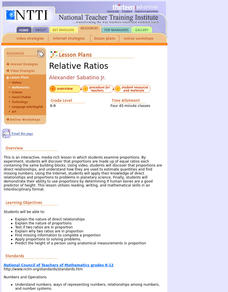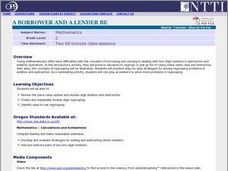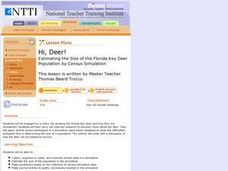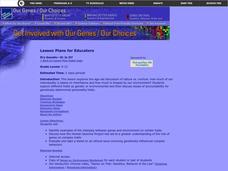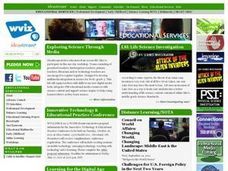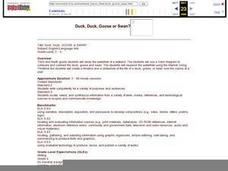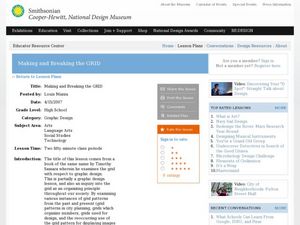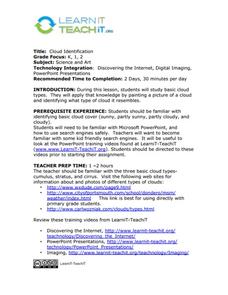Curated OER
Texas Treasures
Students explore the meanings of the word "treasure," and examine the use of clay in the construction of buildings in San Antonio, Texas. They examine clay artifacts, and watch a video about pottery artist, Harding Black. Students then...
Curated OER
Native California Americans
Fourth graders study the differences in the ways of life of five different Native California Tribes. They assess the use of technology, computers and the Internet as valuable investigation tools.
Curated OER
Making a Travel Brochure
Third graders research the cities in Florida and discuss information about that city. In this travel brochure lesson, 3rd graders develop a list of attractions, slogan, and find facts about the city they are studying. Students work on...
Curated OER
Relative Ratios
Students discover that proportions are made up of equal ratios each containing the same building blocks. They, using the Internet, apply their knowledge of direct relationships and proportions to problems in planetary science.
Curated OER
A Borrower And A Lender Be
Second graders practice addition and subtraction in this fun, technology-based Mathematics lesson for the second grade classroom. The lesson includes resource links, video clips, interactive websites, and a section for pre-lesson...
Curated OER
The Three Branches of Government
Students write about working in one branch of government. In this branches of government lesson, students read about the three levels of government using various websites and then work in groups to discuss, illustrate and write about...
Curated OER
Hi, Deer!
Students collect, organize by table, and examine census data in a simulation, estimate the size of the population in the simulation and make predictions based on the collection of census simulation data.
Curated OER
Picking Pythagoras
Students discover that side measurement is used in determining angle classification of a triangle. By squaring sides, they predict whether triangles be right, obtuse, or acute. They prove the Pythagorean Theorem and use it to solve...
Curated OER
Healthy Eating
Students explore how they can make healthy food choices and assess how "eating healthy" requires knowledge and planning ahead. They review and discuss The Edible Pyramid as well before they complete this project online. Each student maps...
Curated OER
Review of Life Cycle
Young scholars illustrate the life cycle of a butterfly. In this life cycle lesson, students use the book From Caterpillar to Butterfly and the Internet to learn about life cycles. Young scholars use different types of pasta to...
Curated OER
It's Genetic--Or Is It?
Students identify examples of the interplay between genes and environment on certain traits and discuss how the Human Genome Project has led to a greater understanding of the role of genes on complex traits.
Curated OER
The Trail of Tears; Its Grief and Loss
Fifth graders trace the development and expansion of the US while studying the Trail of Tears. They examine the political factors and analyze the impact the Indian Removal Act had upon a society. They present a case for or against the...
Curated OER
The Cold War Warrior Defending: The Moral Beacon of the World
Students identify President Reagan's domestic and foreign policy, describe America's attitude toward communism, list characteristics which endeared Reagan to the American people, and explain why some Americans spoke out against Reagan's...
Curated OER
It's A Snap! (Place Value Made Easy)
Students are introduced to the importance of using place value in number systems. They view a video, play games, explore websites and research the pay scale of three jobs that interest them.
Curated OER
Activating Students
Students view and analyze one example of student activism in the 1960's and then apply their learning to their own situations. They work cooperatively to develop and implement their own "activist" or community service learning plan.
Curated OER
Duck, Duck, Goose or Swan?
Learners study the waterfowl of a wetland. They use Venn diagram to compare and contrast the duck, goose and swan. They research the waterfowl using the Internet. They create a timeline and slideshow of the life of a duck, goose, or swan...
Curated OER
GANDHI'S INDIA
Students describe key events in the life of Gandhi. They determine why knowledge of geography is necessary to understand the history of the people in a place or region. They write a summary of how the events in Gandhi's life,...
Alabama Learning Exchange (ALEX)
It Is in the Blood
Ninth graders identify bloodborne pathogens and examine universal precautions. They listen to a speaker from the Health Department speak about bloodborne pathogens, conduct Internet research and discuss OSHA guidelines for protection,...
Curated OER
Civil Rights Webquest
Students, working individually and in teams, research life in their community during the civil rights era. They take part in a role-playing discussion about civil rights issues based on their research, and create individual and group...
Curated OER
Designing Machines
Students explore simple and compound machines. In groups of four students, they design a compound machine using K'NEX that has a stated purpose and consists of at least two simple machines.
Curated OER
Graphing the Weather
Fourth graders predict the weather for their area using simple weather instruments. They take readings for a month during a season and graph their results. Students describe weather patterns based on their data and predict future weather...
Curated OER
Making and Breaking the Grid
High schoolers examine the grid in terms of a method of organization in our society as well as graphic design. In this "Making and Breaking the Grid" lesson, students design solutions to common problems and draw conclusions about...
Curated OER
The Appearance of a Graph
Sixth graders understand that the appearance and increment used on the x and y axis in a graph change how it looks. In this graphing lesson, 6th graders work in pairs and interpret graphs using different axes. Students collect graphs...
Curated OER
Cloud Identification
Students study types of clouds. In this earth science lesson, students read the book The Cloud Book. Students use photos to examine each type of cloud and visit suggested websites.





